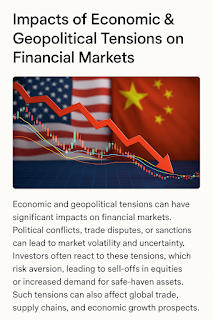What To Know About The Impacts of Economic & Geopolitical Tensions on Financial Markets
In the high-speed, always-on world of financial markets, economic and geopolitical tensions are like emotional whirlwinds—swift, chaotic, and capable of flipping bullish vibes into full-blown panic overnight. From trade wars to armed conflicts, these macro-level forces shape the rhythm of global finance in powerful, often unpredictable ways.
1. Market Volatility: The First Ripple
Let’s get real—when geopolitical drama heats up, volatility becomes the name of the game. Investors get nervous. Hedge funds rebalance. Retail traders panic-buy gold like it’s 2008 all over again.
Take the Russia-Ukraine conflict, for instance. It spooked global energy markets and sent European equities into a tailspin. Energy prices shot up, inflation soared, and central banks had to play catch-up with interest rate hikes. Boom—ripple effect achieved.
In 2025 the financial markets is being greatly impacted by the on going Trump tariffs and trade disputes.
2. Safe-Haven Assets Go Mainstream
Whenever uncertainty hits the headlines, investors flee risky assets (think stocks, especially in emerging markets) and make a beeline for the safe havens—U.S. Treasuries, gold, and the almighty dollar. It’s the flight-to-safety dance, and it plays out every single time.
Geopolitical tension? Check. Dollar index soaring? Double check.
3. Currency Fluctuations Get Wild
FX traders, buckle up. Geopolitical shocks send currencies into a frenzy. A tweet from a major leader? Boom. The yen strengthens. Sanctions imposed? The ruble tanks. Political unrest in a key trading region? The euro flutters like a leaf in the wind.
Currency pairs start acting like altcoins on a Saturday night—high drama, high risk, high reward (if you’re lucky).
4. Commodities React Instantly
Economic tension = supply chain stress = commodity price spikes.
When OPEC plays politics, oil becomes a geopolitical weapon. When the Red Sea sees conflict, global shipping costs balloon, pushing prices of everything from coffee to copper higher. Traders in these markets know—they're not just betting on supply and demand; they're betting on global stability (or lack thereof).
5. Investor Sentiment Tanks
Fear is contagious in finance. When geopolitical risk enters the chat, investor confidence dips faster than a meme coin after a rug pull. This has a direct impact on capital flows—especially in risk-on sectors like tech or speculative startups.
Venture capital tightens up. IPOs get delayed. And everyone starts hoarding liquidity like it’s Black Friday.
Conclusion
Because let’s be honest—markets don’t just reflect the economy. They react to the drama of the world stage.

Comments
Post a Comment